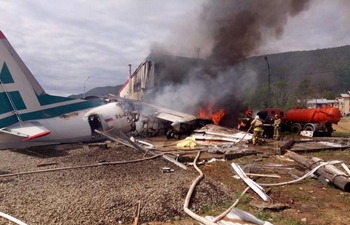WASHINGTON, June 27 (Xinhua) --Astronomers from the Commonwealth Scientific and Industrial Research Organization (CSIRO) determined for the first time the precise location of a one-off burst of cosmic radio waves lasting only a split second.
The study published on Thursday in the journal Science showed that a telescope in Western Australia detected the radio burst originating in the outskirts of a Milky Way-sized galaxy about 3.6 billion light-years away.
Astronomers discovered fast radio bursts in 2007 and since then 85 have been detected. Most of them are "one-off" and a small fraction are "repeaters" that recur in the same location.
In 2017, astronomers found a repeater's home galaxy, however, pinpointing a one-off burst has been much more difficult, since fast radio bursts tend to last less than a millisecond.
CSIRO developed a technique to freeze telescope data less than a second after a burst meets the telescope.
"If we were to stand on the Moon and look down at the Earth with this precision, we would be able to tell not only which city the burst came from, but which postcode and even which city block," said CSIRO scientist Keith Bannister, who led the study.
They even found that the exact starting point of the burst was 13,000 light-years out from the galaxy's center, according to the study.
Keck, Gemini South and the European Southern Observatory's Very Large Telescope, three of the world's largest optical telescopes, then captured a picture of the galaxy.
The "repeater" burst, previously localized in 2017, came from a tiny galaxy which is producing lots of stars while the newly detected "one-off" burst came from a massive galaxy, forming relatively fewer stars, according to the study.
The findings suggested that fast radio bursts can be produced in a variety of environments, or that the seemingly one-off bursts detected are generated by a different mechanism.
The cause of fast radio bursts remains unknown but the ability to determine their exact locations is a big leap towards solving this mystery, according to the study.












